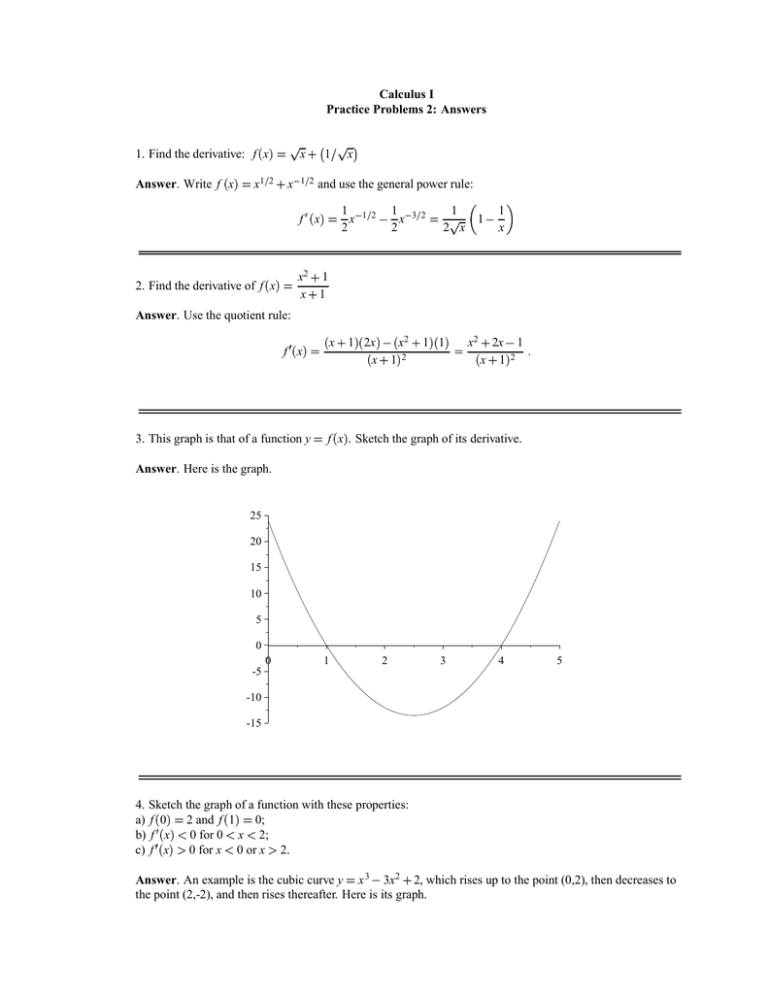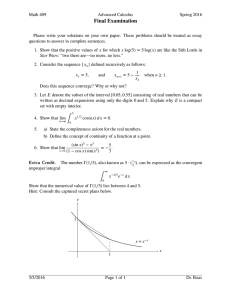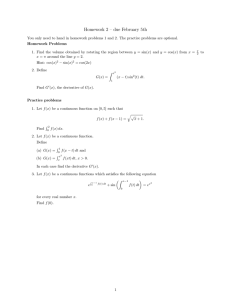Document 11890464
advertisement

Calculus I Practice Problems 2: Answers 1. Find the derivative: f x x 1 x Answer. Write f x x1 2 x 1 2 and use the general power rule: 1 x 2 f x 2. Find the derivative of f x 1 x 2 1 2 3 2 1 2 x 1 1 x x2 1 x 1 Answer. Use the quotient rule: f x 3. This graph is that of a function y x 1 2x x2 1 1 x 1 2 x2 2x 1 x 1 2 f x . Sketch the graph of its derivative. Answer. Here is the graph. 25 20 15 10 5 0 0 1 2 3 4 5 -5 -10 -15 4. Sketch the graph of a function with these properties: a) f 0 2 and f 1 0; b) f x 0 for 0 x 2; c) f x 0 for x 0 or x 2. Answer. An example is the cubic curve y x 3 3x2 2, which rises up to the point (0,2), then decreases to the point (2,-2), and then rises thereafter. Here is its graph. 2 1.5 1 0.5 0 -1 -0.5 0 0.5 1 1.5 2 2.5 3 -0.5 -1 -1.5 -2 The next two problems are about the motion of an object traveling near the earth’s surface in a vertical straight line. If we let x t be the height of the object (measured from ground level) at time t, then we have the formula x t 16t 2 v0t x0 where x0 is the initial height of the object, and v 0 is its initial velocity. Check that v t 32t v0 a t 32 5. A man standing at the edge of the roof of a building 120 feet high throws a ball directly upwards at a velocity of 48 ft/sec. a) How high does the ball go? b) Assuming that it proceeds to fall along the side of the building, how long does it take to hit ground level? Answer. a) In this case x0 120 and v 0 x t 48, so our equations of motion are 16t 2 48t 120 v t 32t 48 We are asked for the maximum value of x t , which we can find by completing the square in the first formula: x t 16 t 2 3t 9 4 120 9 16 4 16 t 3 2 2 156 so the maximum height is 156 feet. Here is another way of seeing this. Notice that at the maximum height the object stops rising and starts falling, so its velocity is 0. Solving the second equation with this value, we find t 3 2 at the maximum height. Now calculate x t for this value of t to get 156. b) It hits the ground when x t 0. So, we solve for t: 0 using the quadratic formula. The roots are t is 16t 2 48t 120 3 t 3 39 2. Since we want the positive solution the answer 2 39 6. Another man standing on ground level throws the ball back to his friend on the roof. At what initial velocity must he throw it in order to reach the roof? Answer. Here x0 0, and v0 is to be found. So our equations of motion are x t 16t 2 v0t v t 32t v0 The condition is that the ball just reaches the height of 120 ft, so we must have v t 0 when x t 120, giving the equations 120 16t 2 v0t 0 32t v0 to solve for v0 . From the second we have t v 0 32; putting that in the first gives 120 leading to the answer v 0 7. Let y 16 v0 32 2 v0 v0 32 16 30 ft/sec. x Find the equation of the tangent line to the graph at the point (2,0.4). x2 1 Answer. To find the slope of the tangent line we must differentiate: dy dx x2 1 1 x 2x x2 1 2 At x 2, we get dy dx 1 4 4 1 2 1 x2 x2 1 2 3 25 This is the slope of the line, (2,0.4) is on the line, so its equation is y 0 4 x 2 3 25 which simplifies to 25y 3x 16. Here is its graph. 0.7 0.6 0.5 0.4 0.3 0.2 0.1 0 0 0.5 1 1.5 2 2.5 3 3.5 4 8. Let C1 and C2 be curves given by the equations C 1 : y x3 x2 C2 : y x2 x. For what values of x do these curves have parallel tangent lines? Answer. The slope of C1 is given by m1 3x2 2x, and the slope of C2 is m2 2x 1. The lines with these slopes are parallel if m1 m2 , so we must solve 3x 2 2x 2x 1 for x. The answer is x 1 3. Here is its graph, showing the tangents only at the positive point. 2 1.5 1 0.5 0 0 0.2 0.4 0.6 0.8 1 -0.5 -1 9. From a point 1000 feet away from the base of a building, the angle of elevation of its roof is 17 degrees. How tall is the building? Answer. Let x be the height of the building. Then x 1000tan 17 = 305.7 feet. 10. A marker is rotating counterclockwise around a circle of radius 4 centered at the origin at the rate of 7 revolutions per minute. a) What is its position after 2.3 minutes? b) How soon after 2.3 minutes will it cross the x-axis again? Answer. After 2.3 minutes the marker has made 7(2.3) = 16.1 revolutions, so is located 1/10 of the way around the circle, at an angle of π 5. Its position is at 4 cos π 5 4sin π 5 = (3.236,2.351). 11. If tan α Answer. sin α 3, what are the possible values of sin α ? 3 2. 12. Express as a function of 2x: sin x cos x sin x cos x Answer. You have to multiply both numerator and denominator by sin x cos x, and use the double angle formulas: cos 2x sin x cos x sin x cos x sin2 x cos2 x 2 sin x cos x sin x cos x sin x 2cos x sin x cos 2 x 1 sin 2x Alternatively, multiply both by sin x cos x getting the equivalent sin 2x 1 cos 2x sin 5x . 0 tan 4x 13. Find lim x ! Answer. We will use the fact that we know the limit of sin x " x and cos x as x # rewritten as lim ! x 0 since limx! 0 4x 5 sin 5x cos 4x 4 5x sin 4x is the same as lim5x ! 0 and lim4x! 0. The limit desired can be 5 sin 5x 4x lim lim lim cos 4x 4 x ! 0 5x x! 0 sin 4x x ! 0 0. 5 4






